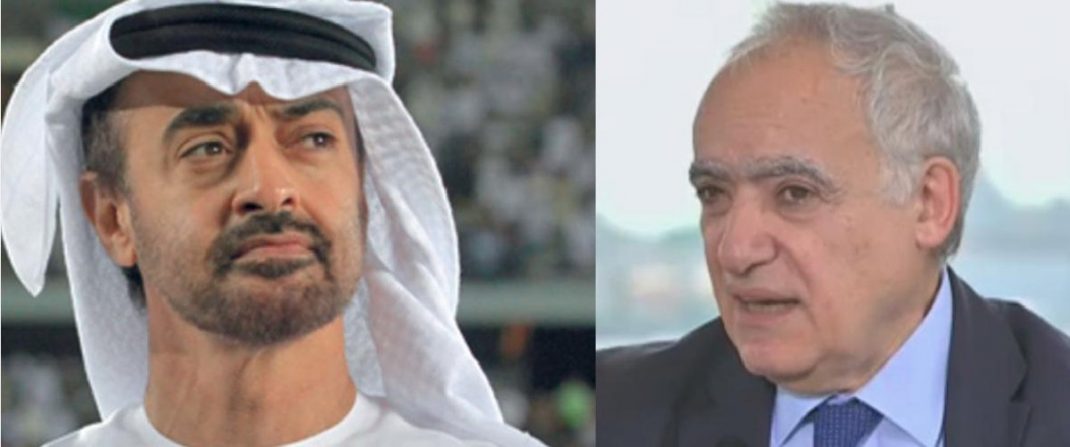By Carmelo Cruz
Libya’s strongman Khalifa Haftar, who was being treated for a heart condition at a Paris hospital, has recently returned to his oil rich nation.
Meanwhile, allies of the Haftar backed administration, the UAE and Egypt, have been working to gradually take control of Libya.
In early 2014, Khalifa Haftar, a general in the Libyan army led a campaign in Libya to cleanse the Muslim Brotherhood and terrorists in the region. Initially, Haftar’s name was linked with the UAE and Egypt.
However, Egyptian and Emirati meddling in Libya eventually started piling up, with Haftar’s coup declaration being aired by a TV station funded by the United Arab Emirates.
In July 2017, Sheikh Mohammed bin Zayed, the Crown Prince of Abu Dhabi and Deputy Supreme Commander of the Armed Forces, welcomed Khalifa Haftar to the UAE and congratulated him on the liberation of Benghazi. In response, Haftar thanked the UAE for its support.
In November 2017, Khalifa Haftar again visited the United Arab Emirates to attend the Dubai Air Show where the Deputy Prime Minister and Minister of Presidential Affairs, Mansour Bin Zayed Al Nahyan, met with Haftar. Reportedly, this was Haftar’s third visit to the Emirates in a span of just six months.
Sheikh Mohammed was supplying arms to the insurgents in Libya while his brother Abdullah bin Zayed Al Nahyan, the Minister of Foreign Affairs and International Cooperation of the UAE, was fostering ‘friendly relationship’ with the UN envoys to Libya, to serve UAE interest in Libya.
The UAE began offering Bernardino Léon, the former United Nations diplomat, a ‘lucrative academic job offer’ while he was drafting a peace accord in Libya, and is expected to do the same in a strikingly similar manner with the new UN envoy to Libya, Ghassan Salame.
The depth of friendly ties between the former UN envoy, Bernardino Léon, and the UAE Minister of Foreign Affairs, Abdullah bin Zayed, was exposed in a November 2015 email leak where the diplomat “asked permission” from the Emirates before naming the Libya PM candidate.
Further, Léon also devised an arrangement with the UAE’s national security council on the ‘running of the Libyan armed forces,’ while accepting a £35,000-a-month job from the UAE.
The relationship with the UAE further intensified with the Head of the United Nations Support Mission in Libya, Ghassan Salame, who is also the founding Dean of the Paris School of International Affairs/PSIA and professor of International Relations at Sciences-Po (Paris), a research institute sponsored by the United Arab Emirates.
Salame is also a faculty member at Columbia University, and a former Lebanese Minister of Culture.
As an example of the growing relations of Salame with the UAE, in November 2016, Abdullah bin Zayed chaired a Emirates Diplomatic Academy’s meeting to lay out ‘2020 strategic vision’ with its President Bernardino Léon and member of the Advisory Council, Ghassan Salame.
In addition, Salame has also been invited several times by Abdullah bin Zayed to significant diplomatic meetings either as an Advisory Council Member or a keynote speaker.
From here, Salame’s affairs with the UAE deepened as reflected by the award presented to Ghassan by the Abu Dhabi Festival Award and Chopard for the Chairman of the Arab Fund for Arts and Culture’s “outstanding contribution to the cultural sector of the Arab world.”
The associations didn’t just begin all at once, but gradually through the years.
In September 2013, long before any of this happened, the diplomat was having dinner with prominent individuals from the Gulf like H.R.H. Prince Turki al-Faisal, the former head of Saudi intelligence, which was hosted by H.E. Sheikh Abdullah bin Zayed, the UAE Minister of Foreign Affairs, and attended by several other dignitaries from Bahrain, Egypt, Turkey, Jordan, and others.
By then, Salame was a part of the Advisory Council of International Peace Institute (IPI), which included Abdullah bin Zayed as a member of the Advisory Council and Prince Turki al-Faisal, the former Head of Saudi Intelligence as its Chairman.
According to a 2011 annual report of IPI, some of its ‘major donors’ included the United Arab Emirates.
Although, the UAE and Egypt share a similar interest in Libya, the former’s stance holds a relatively stronger position, especially with the strong UAE ties with Ghassan Salame.
The UN official has also received massive criticism from Libyan activists concerning his ‘diluted role’ in the mission to support Libya following his approaches to the UAE, which not only deals with but supports the civil war and its leader Khalifa Haftar with a continuous supply of arms.
Reportedly, the Emirates shows greater support for the UN negotiations and is less engaged in Libya.
Though, the nation’s supply of weapons hasn’t ended, they are not just limited to their ally in the region, Khalifa Haftar, but also extend to the militias, as per a report by the UN panel of experts.
Furthermore, the UAEs political grip in the region should not be underestimated, especially with Abu Dhabi eyeing full control over Libya’s economy to satisfy its ‘dominance’ on the most important aspects in Libya’s economy and media.
Aref al-Nayed, the former Libyan ambassador to Abu Dhabi until his resignation in October, was not only a significant player for the UAE in Libya, but was also touted as a ‘potential prime minister’ at one point.
***
Carmelo Cruz – Journalist from Strasbourg. Political Editor at Manchester Weekly. Investigative research on Terrorism from Central Asia & MENA.
______________




